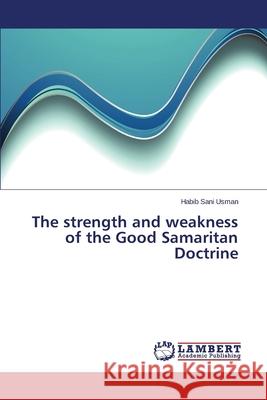The strength and weakness of the Good Samaritan Doctrine » książka
The strength and weakness of the Good Samaritan Doctrine
ISBN-13: 9783659469299 / Angielski / Miękka / 2015 / 100 str.
The United States' Communication Decency Act (CDA) 1996 is a law which promotes free speech, but regulates pornographic and defamatory contents on the Internet. The CDA also provides immunity to ISPs against civil liability for the act of'blocking and screening any deemed offensive material'that has been posted by third parties on the Internet. This shield against civil liability for blocking and screening contents on the Internet is known as the "Good Samaritan Doctrine."The Good Samaritan Doctrine is not an absolute immunity for ISPs against liability for third party contents on the Internet, but a qualified immunity which can be lost once it is established that an ISP is contributory negligent or has aided or abetted third party content development. This proposition has been affirmed by the ruling in the case of JONES v. DIRTY WORLD ENTERTAINMENT RECORDINGS, LLC, Dist. Court, ED Kentucky 2013.the ruling in the JONES case seeks to balance the freedom of expression of anonymous posters on the Internet as guaranteed by the First Amendment to the United States Constitution, and the protection of reputation vis-a-vis the right to privacy of aggrieved victims on the Internet."
The United States Communication Decency Act (CDA) 1996 is a law which promotes free speech, but regulates pornographic and defamatory contents on the Internet. The CDA also provides immunity to ISPs against civil liability for the act ofblocking and screening any deemed offensive materialthat has been posted by third parties on the Internet. This shield against civil liability for blocking and screening contents on the Internet is known as the "Good Samaritan Doctrine."The Good Samaritan Doctrine is not an absolute immunity for ISPs against liability for third party contents on the Internet, but a qualified immunity which can be lost once it is established that an ISP is contributory negligent or has aided or abetted third party content development. This proposition has been affirmed by the ruling in the case of JONES v. DIRTY WORLD ENTERTAINMENT RECORDINGS, LLC, Dist. Court, ED Kentucky 2013.the ruling in the JONES case seeks to balance the freedom of expression of anonymous posters on the Internet as guaranteed by the First Amendment to the United States Constitution, and the protection of reputation vis-à-vis the right to privacy of aggrieved victims on the Internet.











